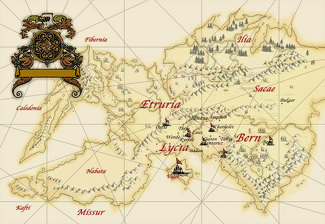The Eight Legends
During a time that now exists only in musical lore and children's tales, great warriors lived - men and women of exceptional power and outstanding morals. They each placed their lives and souls in a weapon of their choosing and, empowered by the faith of the people, stormed forth to protect their world.
Their foe was of phenomenal might, god-like beasts that scraped the clouds with their horns and crushed entire kingdoms underfoot. Entire civilizations took up arms and marched to their deaths against these monsters, transforming serene landscapes into ghastly swamps of decaying flesh and charred bone.
These eight champions gathered what remained of the able-bodied men and marched for the home of the beasts. They charged without fear and without remorse, slaying the beasts first by pairs, then by dozens, then by hundreds. The few warriors they had chosen to bring, strengthened in their presence, became a spear of steel and fire and struck at the beast's heart - an evil city of fantastic size, built by and for the winged demons. They struck and screamed and chanted, and with the eight legends at their head, they prevailed.
Each hero went his and her own way, but before they said their farewells, they all agreed to seal away their weapons. The forces of that war had reshaped the very land they stood on, and it was their belief that their arms had drunk of that chaos and taken a life of their own - that each had become an entity of untold power, and in the wrong hands, could do more harm to Elibe than the very monsters they had slain.
The Dark Continent

Today, these weapons sleep in sacred shrines across the world; each guarded by the spirit of their master, by his most devoted, and by cunning traps and mazes. They sleep, unaware that they are protected foremost by man's indifference. The seven nations of Elibe concern themselves only with the immediate tribulations, considering the great Scouring of the past to be nothing but a nightmare - one they need pay no further heed to.
The modern world exists as it did in the old days only out of tradition and fear. Few men have true passion for their culture, and patriots are mocked as backwards and naive. The vast diplomatic empire of Etruria has its seeds in every corner of the dark continent. Etrurians hire Ilians to police Bernite craftsmen, who build Lycian structures with Western stones to house Sacaean horses. The cosmopolitan, melting pot nature of the sprawling Etrurian megacities has raised generations who believe that they have achieved Utopia.
And there are men who will go to any lengths to defend it.
Though the Etrurians believe themselves to be the crown of the world, the members of the other nations scowl in disgust. The Western Isles, whose only government structure is a secluded sect of prophet-monks, carry the largest of the hedonistic nation's weight. Young men whose entire lives were spent in the presence of the same thirty people flock to labor camps, enchanted by the promises of a glamorous, instant-gratification lifestyle.
Under the powder-capped shoulders of the Ilian ranges, the amazons of the sky bear nothing but growing contempt for the Etrurian aristocracy. While they spit condescending remarks and brag about overcharging their clients, they all know in their guts that they have grown dependent on their business.
The Hero
Meanwhile, the Lycian conference table threatens to collapse under the weight of slander; as it has for centuries, and as it never will. Men who have spent their lives studying and never learning stand and shout - unanimously, they cry that they have grown weak from inaction. Once each season, they ride vast distances and agree (disputably) that, for too long, they have only sat and spoke of change. The weary duke and his few allies grimly decide on what next to sacrifice, in order to keep the nation afloat.
His son is the brash, independent Prince Uther. With the same tired eyes as his father, the lordling signs over command of his troops - a 'small', three-column knight brigade, issued to Pherae as a precaution. Today, Prince Desmond of Bern was personally finalizing the negotiation of a livestock embargo's termination. He always did these things with a thousand-strong flock of wyverns at his back, so precautions had to be made. Both armies would camp seven miles from the nearest city border, ready to tear each other to pieces, until Desmond finished flexing his political muscles and called for the march home.
Uther could not be happier to be rid of the stench of horse dung, steel and sweat. The only things on his mind were his good friend, the honorable Lord Elbert, and Elbert's newborn son, Eliwood. He could never have foreseen the events a Western chieftain and an Ilian commander would soon drag him into.
In the years to come, he would still puzzle over what exactly it was.